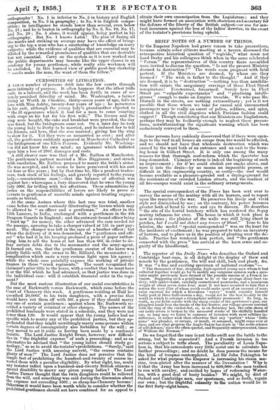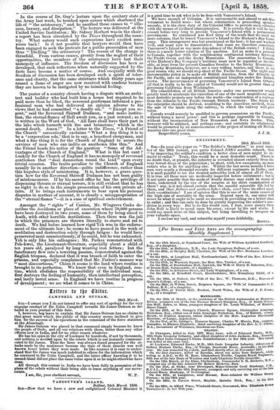BRIEF NOTES ON A NUMBER OF THINGS.
Jr the Emperor Napoleon had grave reason to take precautions, because certain sober citizens meeting at a tavern discussed the retrospective historical question of "regicide," what must not Lord Derby and his colleagues think when in the same celebrated "Forum" the representatives of this country there assembled were invited to discuss the question, "Is not the present Ministry doomed to destruction ?" The words seem pregnant with fatal portent. If the Ministers are doomed, by whom are they doomed ? "The wish is father to the thought." And if they are doomed, it is to "destruction "—nothing less than annihila- tion will satiate the sanguinary cravings of those Fleet Street conspirators ! Forewarned, forearmed. Surely here in Fleet Street are "culpable expectancies" and "practising intelli- gences" enough to make an Empire tremble. We who pass Mr. Disraeli in the streets, see nothing extraordinary ; yet is it not possible that those whom we take for casual and unconcerned passengers may be really an escort of police, soldiers, and spies, clothed in all the civil disguises which Parisian fashion could suggest? Though considering that our Ministers are Englishmen, perhaps they may be foolhardy enough to neglect these precau- tions, notwithstanding the significant warning which has been audaciously conveyed to them.
Some persons have suddenly discovered that if there were open- ings to the roof in all houses an escape from fire would be afforded, and we should not have that wholesale destruction which was caused by the want both of an entrance and an exit to the burn- ing house in Gilbert Street. It is only one among the many reasons for that thorough roof-reform which the Spectator has long demanded. Chimney reform is indeed the beginning of such an improvement ; for if we could abolish our smoke above, and turn it into the drain—by no means an impossible process, or difficult in this engineering country, or costly—the roof would become available as a pleasure-ground and a drying-ground for the residents of our crowded London streets, and the readiest of all fire-escapes would exist in the ordinary arrangements.
The special correspondent of the Times has been sent over to survey- the scene of the mutiny with all its horrors, and to report upon the remains of the war. He preserves his lively and vivid style not diminished by use ; on the contrary, his power becomes greater both of hand to write and eye to rliseern. He describes "the site of the horrid butchery which has rendered the Sepoy mutiny infamous for ever. The house in which it took place is now in ruins ; the plaister of the walls was still lying about in patches, but I could not detect any traces of blood." True to his mission, the model "special correspondent" was on the hunt for the incidents of excitement ; he was prepared to take an inventory of horrors, and to place us in the position of gloating over the de- tai/s. Practice has rendered him perfect, and "the gentleman connected with the press" has arrived at the keen sense and sa- gacity of the bloodhound.
The reporter of the Daily News who describes the Oxford and Cambridge boat-race, is all delight at the display of thew and muscle by the gentlemen, the will and skill, luck and pluck, &c. It was "a fine and exciting specimen of national customs "— " The thousands of fine, strapping, high-spirited young men whom it had collected together would go far to modify any sanguine opinion such a spec- tator might previously have formed of the possible success of a French in- vasion. Supposing such a gentleman to be of the average shiny-boot va- riety, with spider-waist, carefully cosnieticized moustache, and a maximum weight of about seven stone four, must it not have occurred to him that a nation the very elite of whose youth could make sport of an amount of mus- cular exertion for which a herculean 'navvy' would consider himself badly paid at three half-crowns a day, would not be the best locality in the world in which to attempt a triumphant military promenade ? So long, in truth, as our fields reecho with the sharp cracks of the sportsman's gun, our ploughed lands bear the tracks of the fox-hunter, our village-greens resound with the ring of the cricket-bat, or, as on Saturday last, the calm sheen of our noble rivers is broken by the measured stroke of the skilfully handled oar, so long may we listen to rumours of invasion with most sublime in- difference, or rather wish than otherwise that any partied' whose little game' was plunder, or ravage, or insult, or conquest, might come over at once, and see what progress the Anglo-Saxon has made in the noble science of self-defence,' since the often-quoted, and frequently-Misrepresented, times of William the Norman."
Do we forget that the race is not to the swift nor the battle tothe strong, but to the organized? And a French invasion is too serious a subject to trifle about. The peculiarity of Louis Napo- leon is, that his antecedents very little assist one to calculate his further proceedings ; and no doubt he does possess the means for the kind of trespass contemplated. Let Sir John Pakington be asked for what purpose the Emperor is increasing his steam ma- rine, iron-plated after the manner of the Devastation ? Why is it that the Army has been increased to 600,000—the men trained to run with cavalry, _and excited by hopes of redeeming Water- loo, with a good deal of booty besides? We might, by dint of Oxford and Cambridge men, our sportsmen and so forth, -regain our own ; but the frightful calamity to the -nation would lie in the first forty-eight hours. In the course of Dr. Guy's lecture upon the sanitary state of the Army last week, he touched upon causes which shortened the life of "the aristocracy," and he ascribed those causes to "idle- ness, luxury, and dissipation." The lecture was delivered at the United Service Institution ; Mr. Sidney Herbert was in the chair ; a report has been circulated by the rintes throughout the coun- try. What outcry would such expressions have excited some years back ! Is it not possible that lawyers would then have been engaged to seek the pretexts for a public prosecution of men thus "libelling" the aristocracy ? The reason of the change is threefold. From various causes, greatly from the neglect of their opportunities, the members of the aristocracy have lost their monopoly of influence. The freedom of discussion has been so developed, that such reflections when naturally o by the facts have become a matter of course. And coequally with the freedom of discussion has been developed such a spirit of toler- ance and charity, that the same strictures which thirty years ago roused a flame of anger are now received with candour because they are known to be instigated by no inimical feeling.
The pastor of a country church having a dispute with an archi- tect and builder who had built him a house but required to be paid more than he liked, the reverend gentleman informed a pro- fessional man who had delivered an opinion adverse to his views that he had committed "a deadly sin." "Except you re- pent," said the Reverend Shirreff Dudman, "and make restitu- tion, the eternal flames of Hell await you, as a just reward; as it is written in the Word of God, All liars shall have their part in the lake which burneth with fire and brimstone,' which is the second death. Amen!" In a letter to the Times "A Friend of the Church" sarcastically exclaims "What a fine thing it is to be a 'corporation sole,' that is to say, a beneficed clergyman, and what a fine thing it is for the Church of England to secure the services of men who can indite an anathema like this." And the Friend heads his notice of the question "Some of the Ad- vantages of the Church of England." What is this but cant ? Luckily for the Church of England it has no monopoly of reverend
m that "deal damnation round the land" upon every rivial occasion. The faults peculiar to the Church of England usually lie in another direction—polite indifference, rather than this bugaboo style of ministering. It is, however, a grave ques- tion how far the Reverend Shirreff Dwain= has not been guilty of misdemeanour. If by his sacred office he has the privilege of dispensing threats or eternal terrors, it is still evident that he has no right to do so in the simple prosecution of his own private af- fairs. If he brings such instruments to bear upon lus personal disputes in matters of account, it is clearly a misappropriation of the "eternal flames "—it is a case of spiritual embezzlement.
Amongst the " sights " of Canton, Mr. Wingrove Cooke de- scribes the Aeeldama or place of execution where 70,000 persons have been destroyed in two years, some of them by being sliced to leath, with other horrible mutilations. Then there was the jail in which the prisoners are thrown literally to starve and rot to death. We had before learned how rigid Yeh was in the enforce- ment of the ultimate law; he seems to have paused in the work of mutilation and destruction solely- through fatigue; he would have persevered most conscientiously, if he could, but he was exhausted. `feh is only like his colleagues ; Mr. Parkes remonstrated with Peh-kwei, the Lieutenant-Governor, especially about a child of ten years old, paralyzed by long wearing iron fetters ; but the functionary flew into a towering passion, remonstrated against the 'English trespass, declared that it was breach of faith to enter the prisons, and especially complained that Mr. Parkes's manner was "most discourteous.' China it seems is the land where routine is brought to its perfection. We know that even in England, rou- tine which abolishes the responsibility of the individual man, first destroys the feeling of humanity, then intellectual perception, and lastly moral sense. In England we have routine in progress of development ; we see what it comes to in China.



































 Previous page
Previous page